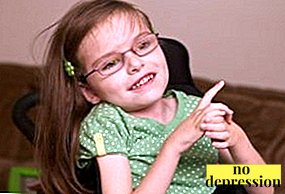The interaction of children and parents is a process that defines a family climate in the present and has an impact on both sides in the future.
Moms and dads are involved in comprehending the secrets of child psychology, coping with this task more or less successfully.
It’s much easier to prevent mistakes armed with knowledgethan to eliminate the consequences of blunders. We dare to suggest that books on child psychology for parents can help adults to conquer these heights.
Top best
Consider a list of books that everyone should read:
- "How to love a child" J. Korchak. The author of the book is a true connoisseur of the childish soul, introducing the idea of the uniqueness of each child, perception of him mainly as a person from the very first days of life. Korchak held such humanistic views that during the war he went to a gas chamber with the children in a concentration camp. This indicates that the Polish teacher regarded the child as an absolutely equal adult subject, deserving in the same degree of freedom and recognition.
With the help of this work, parents can see something unique in their child, understand that he has equal rights with them, and, accordingly, to show, when educating, not a cautionary, but a respectful attitude.
- “Communicate with the child. How? ”Yu.B. Hippenreiter. Julia Gippenreiter, Professor, Department of Psychology, Moscow State University Lomonosov, writes about how important competent communication with a child is.
The purpose of the book is to explain to parents that children catch the slightest reactions from their mothers and fathers, and on this basis form their behavior.
Accordingly, it is in the interests of adults to arrange everything so that the interaction is accompanied by as few negative manifestations and conflicts as possible.
- “If a child is difficult” L. Petranovskaya. Here we consider a separate aspect of parent-child relationships - this is the problem of adaptation of the adopted child and the way to interact with him.
 Of course, not everyone goes through such a stage in their lives, but the difficulties considered by the author help to bring out the patterns of effective communication with their own child.
Of course, not everyone goes through such a stage in their lives, but the difficulties considered by the author help to bring out the patterns of effective communication with their own child.The book will be useful to parents who hold the opinion that cry and pressure are the best teachers, whose value can be rethought after reading.
- "What if a child drives you crazy" Eda Le Shan. Often parents would like to see right through their child to understand the reasons for his unproductive behavior. The work, written by E. Le Shan, has every chance to bring moms and dads closer to the realization of this dream.
Before you fight the protests of your children and apply authoritarian measures to them, you need to think about the fact that this behavior is something.
No need to go crazy if you can just be patient and try to figure out everything that happens.
- “Small children and their mothers” D. Winnicott. The book focuses on mothers who are so different from each other, but at the same time they are all united by one thing - the love of their offspring. How to give your care and affection in order not to lose yourself?
 What to do to not get depressed from the difficult relationship with your child? Be sure: after reading this work, you will be able to answer all these questions. Fear of becoming a bad mother for your children will not drown your Self so much, and you, developing yourself first of all as a full-fledged mature personality, will convey your attitude to the child.
What to do to not get depressed from the difficult relationship with your child? Be sure: after reading this work, you will be able to answer all these questions. Fear of becoming a bad mother for your children will not drown your Self so much, and you, developing yourself first of all as a full-fledged mature personality, will convey your attitude to the child. - "Theory of Attachment" D. Bowlby. D. Bowlby is the author of attachment theory, which serves as the basis for the problems of developmental psychology. The text is written in scientific language, so you need to tune in to a careful and thoughtful reading. Attachment is a type of relationship between a child and parents, which influences the formation of a childish character.
Surprisingly, the echoes of this manifest themselves in adulthood: many psychological problems of a person are reduced to his past relationship with mom and dad.
Finding the opinion of the founder of the theory is a sure way to prevent difficulties and try to think about the future of your child.
- “Before your child drives you crazy.” N. Latta. Conflict interaction is a problem that each parent faces. Sometimes quarrels become unbearable, which causes families to flee to psychologists.
 Nigel Latta believes that with all the difficulties you can cope in a rather short time, while maintaining the psychological well-being of their relatives.
Nigel Latta believes that with all the difficulties you can cope in a rather short time, while maintaining the psychological well-being of their relatives.He appeals to parents without unnecessary formalities, which provides ease of style and ease of dialogue with the author.
In order not to bring the communication with the household to nervous breakdowns, you better stock up on this work: in most cases, in most cases, the problem is easier to prevent than to decide upon the occurrence of consequences.
- “An independent child, or how to become a 'Lazy Mother'” by A. Bykov. If you decide everything for your children and do not give them a step to step without your approval, it's time to read this manual.
Excessive control destroys responsibility in a child for his actions, ability to choose, decisiveness and confidence.
Growing up, he is not able to fully interact with others, as all the time he is waiting for support from his parents. A new approach to education implies relying on the child’s independence, provoking his interest in everything that happens, engaging in business and forming discipline.
- "A book for imperfect parents" I.Mlodik. Do you know this pattern, according to which parents who have not realized themselves in any sphere, are trying to embody their claims in children? Irina Mlodik does not believe that such striving leads to positive consequences: a child may suffer from an inferiority complex or push himself to the limit with perfectionism.
The ability of parents to recognize their imperfections and realize that it is impossible to become ideal through ideal children is something that readers should learn.
The value of parent-child relationships is to be able to see individuality in your baby, albeit with flaws, and to communicate with the child, not as someone who has not achieved something, but as a loved and respected person.
- "Non-standard child" V. Levy. In this work, it attracts primarily the manner of presentation: the author recalls his stories and tells of what he had to go through himself. The book is not perceived as a collection of tips or psychological article. This is a story in which everyone can find himself. Parents can outline new ways to build warm relationships with the child, forming a trusting atmosphere in the family.
- S. Forward "Toxic parents". The American psychotherapist considers the heavy themes of violence of all kinds over children in the family.
 The author believes that such destructive behavior of parents is a consequence of the strong position of the “inner child”, which persists in the adult and pushes him to destructive and rash acts.
The author believes that such destructive behavior of parents is a consequence of the strong position of the “inner child”, which persists in the adult and pushes him to destructive and rash acts.The special value of the book are the techniques proposed to neutralize the negative effects of the manifestations of "toxic parents."


Literature on education
Young children
V. Dmitrieva - “Methods of early development of Maria Montessori. From 6 months to 6 years ".
The technique of Maria Montessori is remarkable in that its use is simple to use and does not require much time.
Parents are offered various exercises, ways of organizing children's space, instructions for making toys, which, by the way, are made from scrap materials.
With this manual you can provide a favorable environment for the development of your child, grow it in harmony.
Sons

B. Volkov “How to raise a boy so that he becomes a real man”.
Who, if not a participant in the Great Patriotic War, knows all the secrets about the proper upbringing of a boy?
B. Volkov, observing the behavior of some soldiers, came to the conclusion that such a work would be useful and help parents avoid mistakes.
When a man grows in a family, a number of questions arise in front of moms and dads. The situation becomes even more ambiguous if the entire burden of upbringing falls on the single mother.
What you need to pay attention to and what dogmas each future defender of the Fatherland is obliged to learn are the problems that can be viewed from a new perspective, after reading this work.
Daughters
J. Dobson "How to educate girls".
The author talks about girls of all ages: about what features appear in each of them, how the environment affects the formation of the female soul, what difficulties may arise.

After reading the book, parents will be armed with the knowledge of what to look for and how to get out of a predicament.
Analyzed sources do not cover the whole range of existing books, but give an idea of their best representatives.
Depending on the goal pursued by the parents, you can stop at one of the proposed benefits and look for the answer to an exciting question.
The best books about parenting - a review for parents:

 Of course, not everyone goes through such a stage in their lives, but the difficulties considered by the author help to bring out the patterns of effective communication with their own child.
Of course, not everyone goes through such a stage in their lives, but the difficulties considered by the author help to bring out the patterns of effective communication with their own child. What to do to not get depressed from the difficult relationship with your child? Be sure: after reading this work, you will be able to answer all these questions. Fear of becoming a bad mother for your children will not drown your Self so much, and you, developing yourself first of all as a full-fledged mature personality, will convey your attitude to the child.
What to do to not get depressed from the difficult relationship with your child? Be sure: after reading this work, you will be able to answer all these questions. Fear of becoming a bad mother for your children will not drown your Self so much, and you, developing yourself first of all as a full-fledged mature personality, will convey your attitude to the child. Nigel Latta believes that with all the difficulties you can cope in a rather short time, while maintaining the psychological well-being of their relatives.
Nigel Latta believes that with all the difficulties you can cope in a rather short time, while maintaining the psychological well-being of their relatives. The author believes that such destructive behavior of parents is a consequence of the strong position of the “inner child”, which persists in the adult and pushes him to destructive and rash acts.
The author believes that such destructive behavior of parents is a consequence of the strong position of the “inner child”, which persists in the adult and pushes him to destructive and rash acts.

